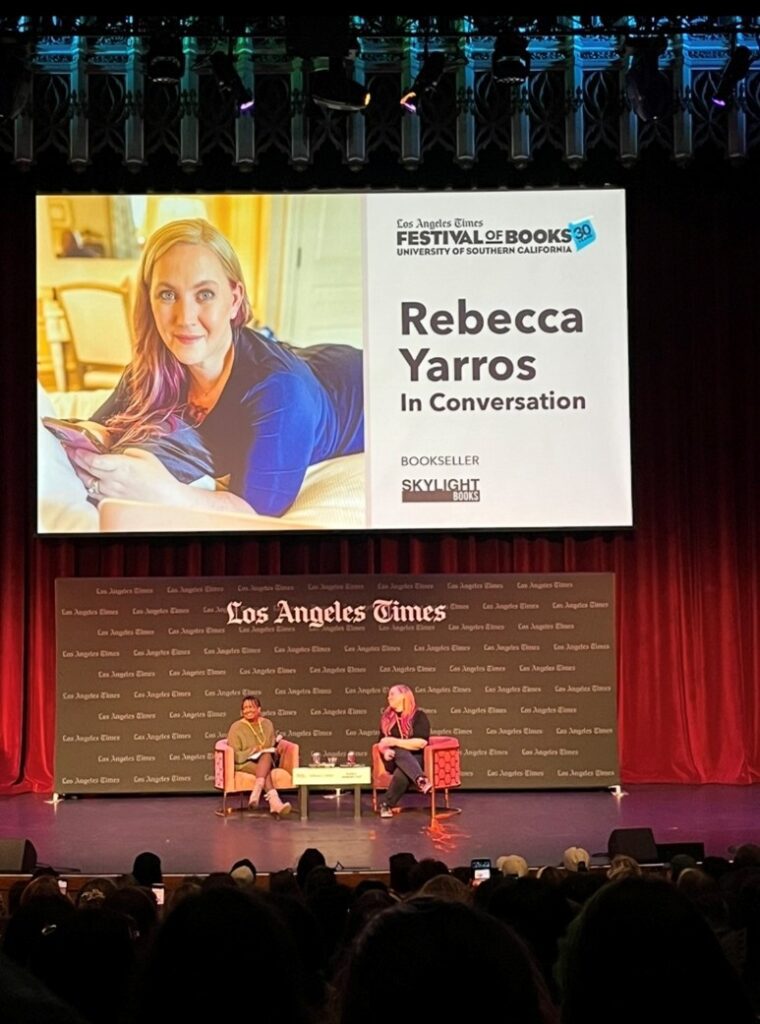
Here we are, back again at the Los Angeles Times Festival of Books.
This year I had some great panelists lined up, a few of which I was lucky enough to snag tickets for before they sold out. It was shaping up to be a great weekend.
Upon our arrival at USC campus, disaster struck: it was raining. For Southern California, this is not a common occurrence, and even worse, a ruinous situation for books. Regardless, we refused to let the rain dampen our spirits, and despite the weather we still managed to get what has quickly become our annual aqua fresca.

Day 1 at the Festival of Books
On the first day, I had the pleasure of attending a panel dedicated to Rebecca Yarros, bestselling author of the Fourth Wing series. My friend and I bought our tickets weeks before and have been waiting patiently for this moment. It was a sold-out panel (selling out in under five minutes!), the auditorium filled with fans of the fantasy series and her contemporary books alike. She spoke about the latest book in the series, Onyx Storm, jumping back and forth between genres, and burnout.
It’s incredible that she has released three books in a predicted five book series in just under two years. She said after writing Onyx Storm, she would have anxiety attacks every time she tried to sit down to write the next book. After taking some time away, she is now able to get back into the series without feeling any sort of pressure.
Managing burnout and writer’s block is something many writers deal with, me included. Sometimes the best thing you can do for your writing is to take time for yourself, recharge, and then return with newfound energy and purpose. The reader can tell if the writing feels forced, and your writing will thank you for it.

During her talk, one topic that stood out to me was the central theme of her series, the erasure of history. She was a history major in college and grew up in a military family, both of which served as inspirations for her book. In it, she famously says, “One generation to change the text. One generation chooses to teach that text. The next grows, and the lie becomes history.” This theme of censorship and erasure is something we continue to deal with as a society; fake news, propaganda, and selective teaching in schools.
Rebecca is also an advocate for banned books and shared how damaging it is to ban important and pivotal stories such as To Kill a Mockingbird, The Handmaid’s Tale, and The Hate U Give, just to name a few. These books explore themes and concepts that are essential to understanding other walks of life but still share a commentary on the world at large. By keeping these books out of schools, we are preventing the next generation from forming their own opinions and truths. During this discussion, Rebecca poignantly said, “Come for our books, come for our thoughts.”
Day 2
On the second day, my friend I were able to go to a screening of the upcoming PBS limited series, Miss Austen (adapted from the book of the same name by Gill Hornby) which follows Jane’s eldest sister, Cassandra Austen, as she discovers old letters from her sister.
Cassandra is often portrayed by historians as a villain, having destroyed several of Jane’s letters and consequentially leaving holes in Jane’s history. However, Gill thinks of Cassandra differently. She believes that historians paint her as a vicious and selfish woman solely on the fact that she burned her sister’s letters. However, when reading them, it is clear that both sisters shared a deep bond. Gill wanted to change the narrative and portray Cassandra in a different light, showing that Cassandra was nothing more than a woman fiercely protecting the sister she loved.

Gill is a self-proclaimed Austen family expert; she has read all Jane’s surviving letters and knows her family members as well as extended family on an intimate level. She even lives on one of the estates where the Austen family frequented when they were young.
In Gill’s book, she was able to blend history with fiction effortlessly, the holes left by Cassandra creating opportunities for creativity. Using her research, Gill was able to piece together what she thought might have happened, while also leaving space for creating drama. If anything, Gill proves that fact and fiction can intertwine blissfully together, while still maintaining Jane Austen’s integrity.
Reflection from the Festival of Books
As the Festival of Books wrapped up, I found myself reflecting on the stories shared—both on the page and in person. Whether it was Rebecca Yarros urging us to protect stories from melting away, Gill Hornby weaving history and imagination together, or the panelists exploring the edges of character and self, each moment was a reminder of why we gather around books in the first place: to connect, to question, and to imagine what might fill the spaces history leaves behind.
Stories have power, and at Sutherland House Experts, we want our books to educate and inspire readers, just like Rebecca Yarros and Gill Hornby did that for me.
Want to be our next author? Submit your nonfiction book. We are always acquiring!
